_We may earn revenue from the products available on this page and participate in affiliate programs. Learn more ›
_
Best Overall
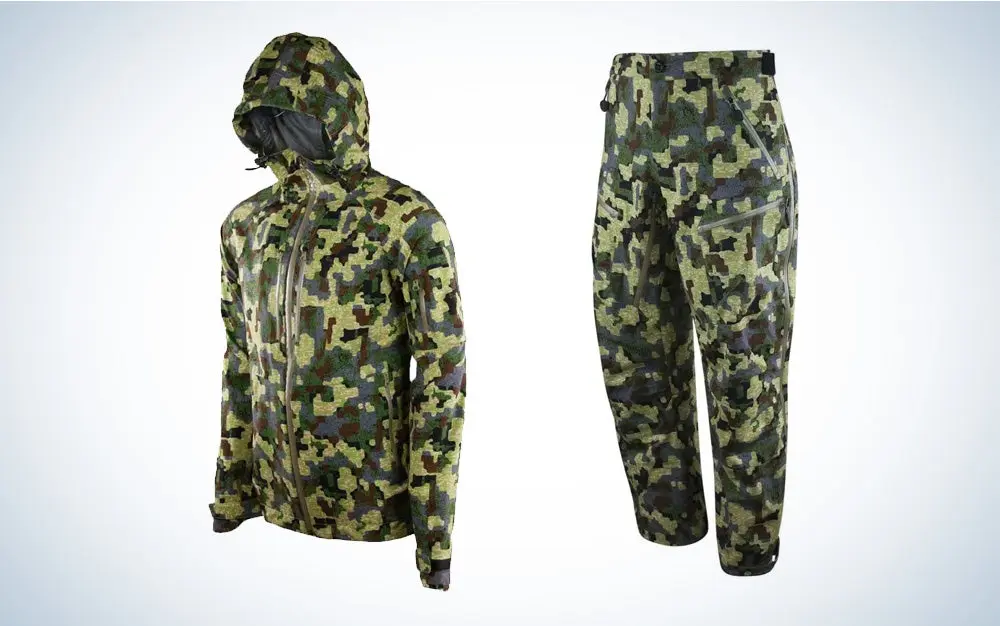
Forloh Allclima
LEARN MORE
Summary
The Forloh AllClima rain jacket and pants are more comfortable and quieter than any piece of rain gear we’ve previously encountered.
Pros
Cons
Best For Spot and Stalk
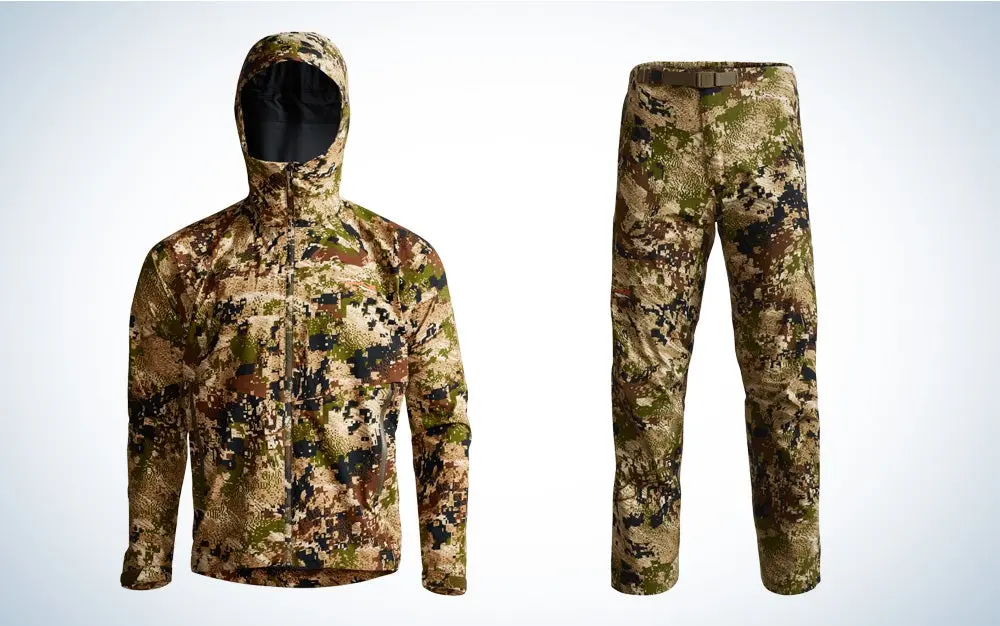
Sitka Dew Point
LEARN MORE
Summary
Sitka’s Dew Point gear is ultralight and breathable, making it perfect for hiking and stalking in warmer weather.
Pros
Cons
Best For Extreme Conditions
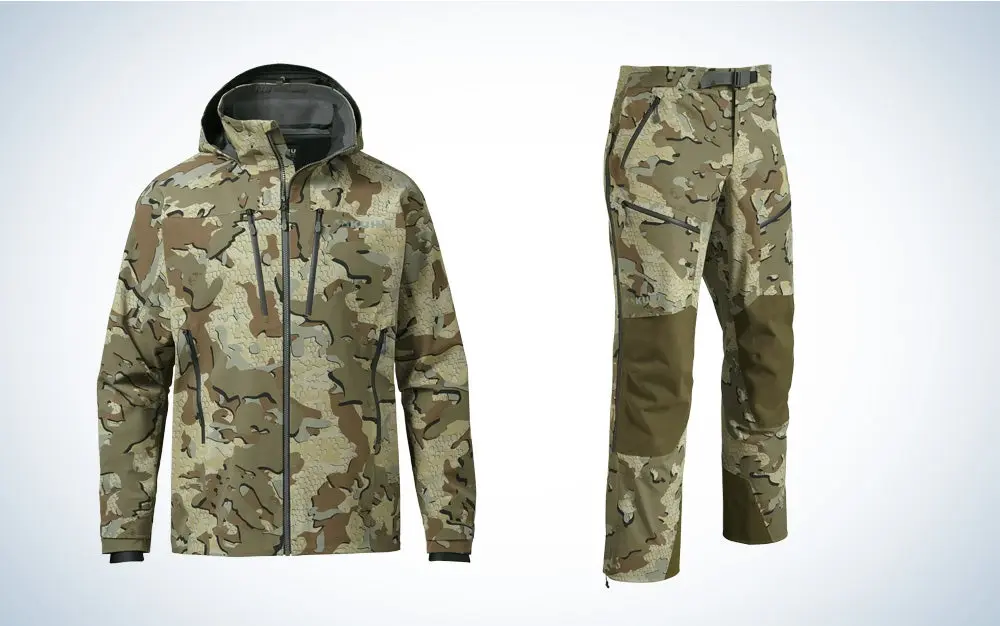
Kuiu Yukon TR
LEARN MORE
Summary
No matter how bad the weather is on your next hunt, the KUIU Yukon TR set will keep you warm and dry.
Pros
Cons
Quality hunting rain gear can make the difference between a successful harvest and an unsuccessful one. Unfortunately, the weather doesn’t always cooperate with our carefully planned hunts. It’s especially frustrating when you’ve been planning a special hunt for a year or more, only for the forecast to show nothing but heavy rain the entire time. In that situation you can either call off the hunt or gut through the wet conditions. No one ever killed a big buck hiding indoors, so to us, the answer here seems clear.
The good news is that modern hunting rain gear is better designed to tame nature’s wrath and keep hunters in the field longer. Our grandfathers and forefathers could only dream of the advancements in waterproof fabrics that mark today’s top choices of rain jackets and rain pants
. The only hard part is deciding what’s best for your hunting style. To help you choose, we put some of the best hunting rain gear to the test, subjecting it to the rainiest, stormiest conditions out in the woods and marsh.
Best Overall: Forloh AllClima
Best for Spot and Stalk: Sitka Dew Point
Best for Extreme Conditions: KUIU Yukon TR
Best For Waterfowl: First Lite Landing Zone
Best Budget: Kryptek Jupiter
How We Picked the Best Hunting Rain Gear
I live in Michigan and fortunately, we’ve had frequent rain with the changing of the seasons this fall. This made it easy to thoroughly test each piece of rain gear in the field in real world hunting conditions. I also didn’t wait for the seasons to start. I went outside and did some hiking and working in this gear whenever it started to drizzle. This allowed me to evaluate the fit, the breathability, and the comfort of each piece. Most importantly, I tested the rain protection qualities by evaluating how dry the layers under the rain gear were.
Additionally, I subjected the outer fabric to much more water than a traditional rainstorm. I did that in a rather unusual way: by standing under the water runoff from my garage roof. This resulted in a heavy torrent of water pounding down on the gear. While it felt rather silly doing this, I found it to be a very valuable test. I can now feel confident in saying I subjected the clothing I tested to more water than they’d likely see during a normal hunt. In addition to these tests, I considered the following factors when evaluating the gear:
Zippers: Are they of good quality? Did I experience any seizing or binding while using them. How well do they hold water out of the pockets?
Noise: How quiet are these garments?
Insulation: How well does the clothing hold in heat? Does it still breathe well without letting in too much cold air?
Value: Does the price match the quality of construction and material?
Best Hunting Rain Gear: Reviews and Recommendations
Best Overall: Forloh AllClima
Best Overall

Specs
Weight: 28 ounces (jacket)
Waterproofing: Three-layer DWR coating
Pros
Surprisingly quiet
Exceptional water protection
Great zippers
Cons
Very expensive
Forloh took things up several notches with their AllClima line
of rain gear. This is easily the most thoughtfully designed and effective rain gear that I have ever used. First, the water shedding qualities of the triple-coated fabric were superb. The layers I wore under this gear never got even a little bit damp. This jacket and pants were both noticeably quieter than the competition when I swished all the fabrics against each other. If I had to pick one piece of rain gear for situations with skittish animals, this would be it.
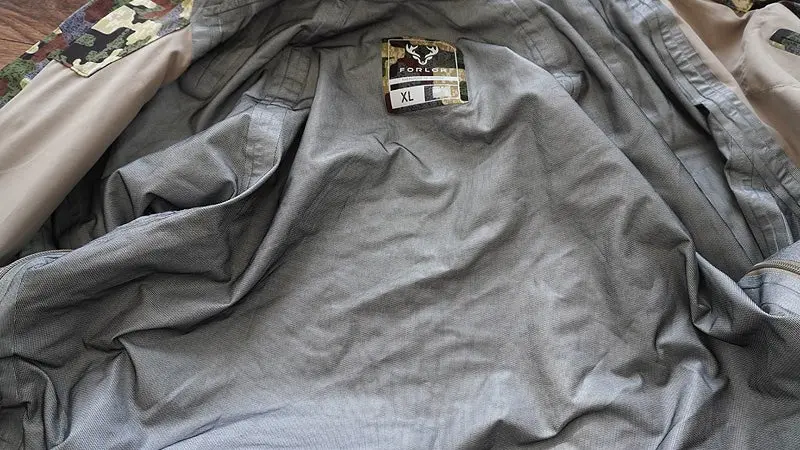
The inside lining of the jacket is well-stitched and comfortable. Travis Smola
But it goes beyond just quiet fabric and great waterproofing. Every aspect of the construction here is exceptional, and the pieces are heavy enough to add a little bit of warmth on their own. I dig the extra reinforcement in the knees of the pants. It’s great for glassing and crawling over rugged, rocky terrain. I’m also a stickler for zippers and Forloh went with large YKK zippers with ovesized pulls that make them smooth to operate.
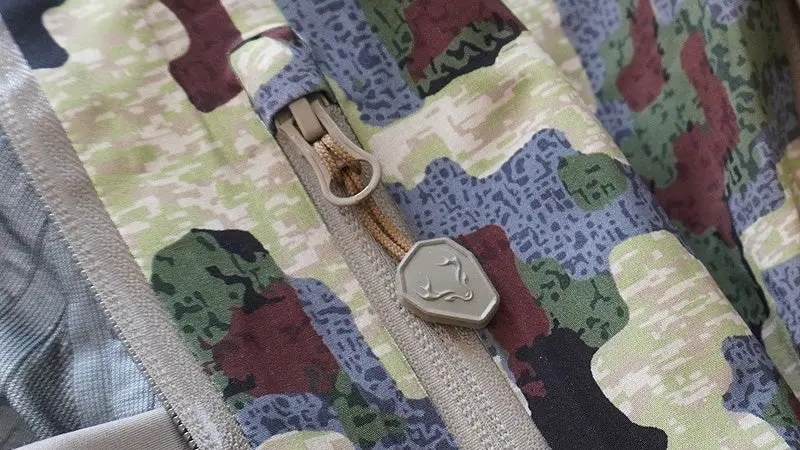
The zippers on this gear seal up well and are easy to open and close. Travis Smola
Forloh makes all their gear in the U.S.A. and the quality really shows. However, because of that, these pieces aren’t cheap. The AllClima jacket is $429, and the pants are $249. That’s no small chunk of change for rain gear. It’s unfortunate that this could price out a lot of hunters on a budget. But if you deal with downpours on a regular basis, this gear is worth the investment.
Best For Spot and Stalk: Sitka Dew Point
Best For Spot and Stalk

Specs
Weight: 12.5 ounces (jacket) 10.5 ounces (pants)
Waterproofing: Three layer Gore-Tex
Pros
Extremely lightweight
Airy
Layers nicely
Cons
Zippers are tiny
For warm weather scenarios that call for lightweight and breathable rain gear, the Sitka Dew Point line
is a great option. I was surprised at how well it shed water considering how light the material is. Pair it with some quality base layers
and this rain gear is going to be perfect for tough spot and stalks at higher elevations. It breathes exceptionally well, keeping you comfortable for those harder climbs up difficult terrain. I found it lightweight and comfy enough that I would probably use it for other rainy outdoor activities outside of just hunting.
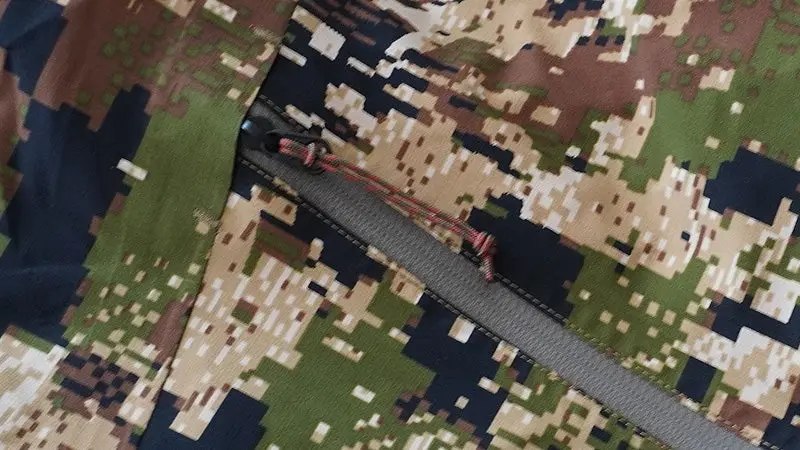
The zippers are functional, I just wish the pulls were bigger. Travis Smola
The main flaw with this rain gear is the zippers. While they’re plenty functional, I just don’t like the size. They’re a little too small, especially when you’re fumbling around trying to open one on a cold day in a downpour. There are pulls on all of them, but they’re still undersized. Only the main zipper has a proper pull. I’ll probably add some larger plastic aftermarket pulls to both garments just to make them easier to find and operate.
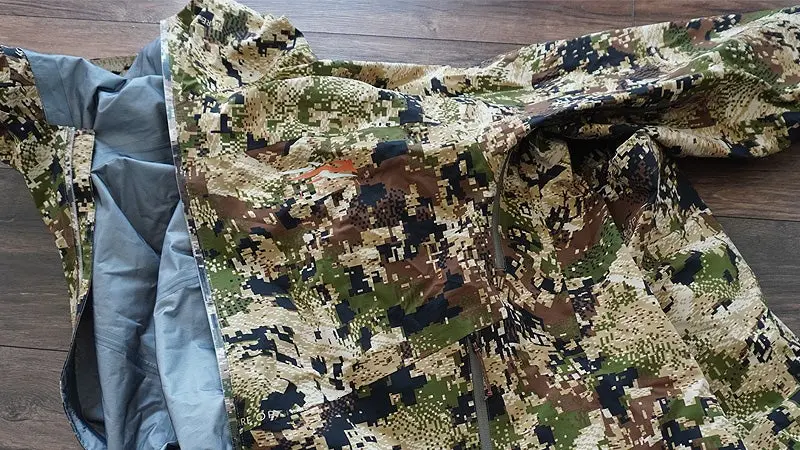
Sitka’s camo patterns continue to be excellent, even on their rain gear. Travis Smola
Other than that small quirk, Sitka has built some extremely functional rain gear here that’s perfect for active hunters who are constantly on the move. The Dew Point line would be a great choice for turkey hunting, too.
Best For Extreme Conditions: KUIU Yukon TR
Best For Extreme Conditions

Specs
Weight: 26.2 ounces (jacket), 23 ounces (pants)
Waterproofing: K-DWR coating
Pros
Extreme water protection
Good zippers
Rubber cuff gasket is a bonus
Cons
Expensive
Heavy
For the worst of adverse conditions, some serious rain gear is required. That’s what the KUIU TR set delivers. Both the pants and jacket are rated at an extreme 30,000mm. Thus, I wasn’t too surprised when this gear kept me bone dry despite an entire day spent out in rainy conditions. Water effortlessly rolls off the outer fabric.
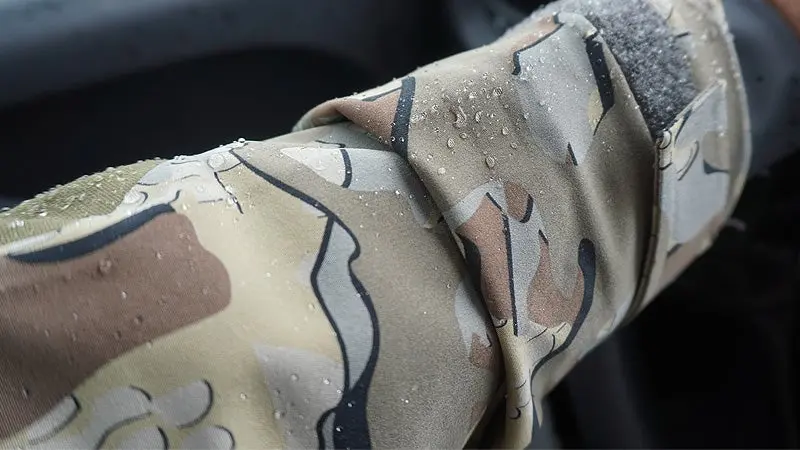
Water beaded up on my arm during testing of the KUIU Yukon TR. Travis Smola
One notable feature of the jacket is the rubber cuff gaskets at the wrists. It’s tough to get your hand through, but once you have it on, it locks out all moisture from seeping in up your sleeves. Subsequently, it also keeps you warmer on colder days. I also appreciated the reinforced sections of the pants. There’s no need to worry about tearing up the knees or seat of the pants crawling over rocks or sitting on logs.
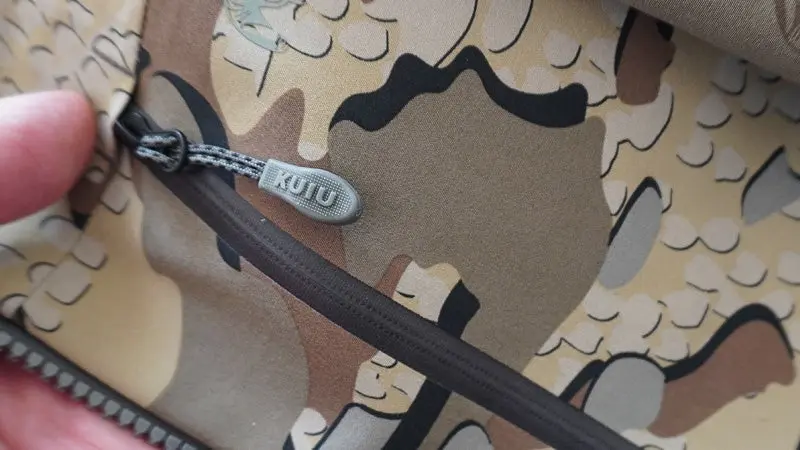
The pulls are small, but have a nice texture that’s easy to grip in all conditions. Travis Smola
All the zippers and pockets seal up against wet conditions extremely well. The pulls are a little smaller than I’d like, but they have a nice texture that’s easy to grip in wet conditions. The Yukon TR line is a little heavier than some other rain gear, but that helps keep out the cold and wind. I’m also just a huge fan of Kuiu’s camo patterns. I’ve found them more effective than any other I’ve used. While the pieces are more expensive than others out there, this rain protection is my top choice for a tough backcountry hunt in extreme conditions.
Best For Waterfowl: First Lite Landing Zone
Best For Waterfowl
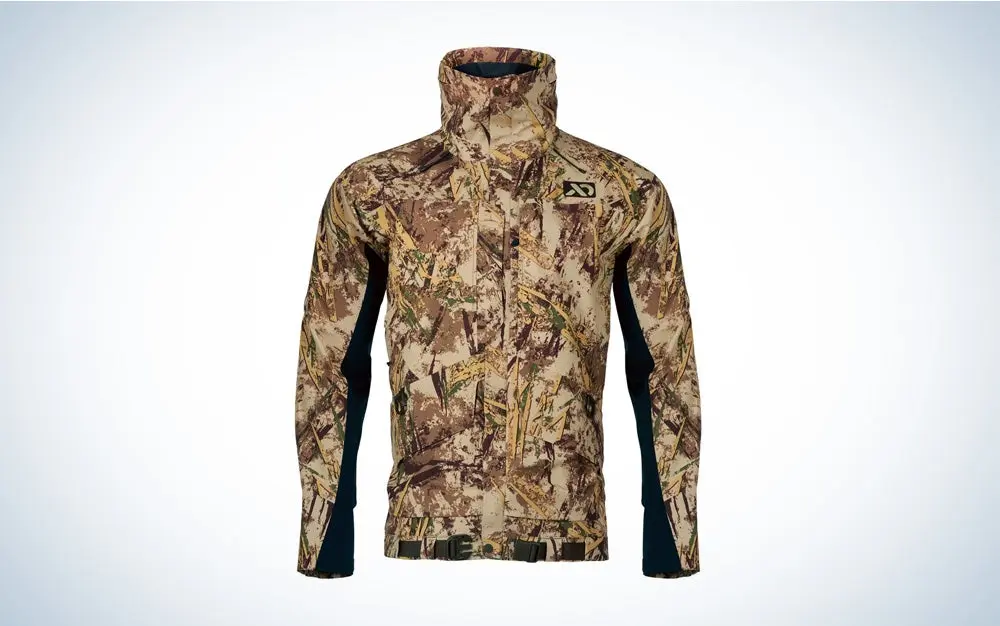
Specs
Weight: N/A
Waterproofing: 4.5L waterproof polyester
Pros
Large pockets
Extremely waterproof
Good insulation
Cons
Hood is hit or miss
Getting wet is a common part of the experience while waterfowling, so you need some really good waterproof gear. The First Lite Landing Zone jacket and Omen Stormshelter pants make for an excellent water-repellent combo. The pockets are a real standout here, especially the large magnetic dump pockets on the front. They’re an ideal place to stow extra shells for those action-filled mornings. The jacket is insulated for frostier mornings in the blind and even comes with a handy wading belt that works well with any duck hunting waders
.
The hood on this jacket is hit or miss depending on the hunter. Unfortunately, some people are going to find it a little bit on the small side. But at least it’s a stowable hood, so you can tuck it out of the way completely if it’s not to your tastes.
Best Budget: Kryptek Jupiter
Best Budget
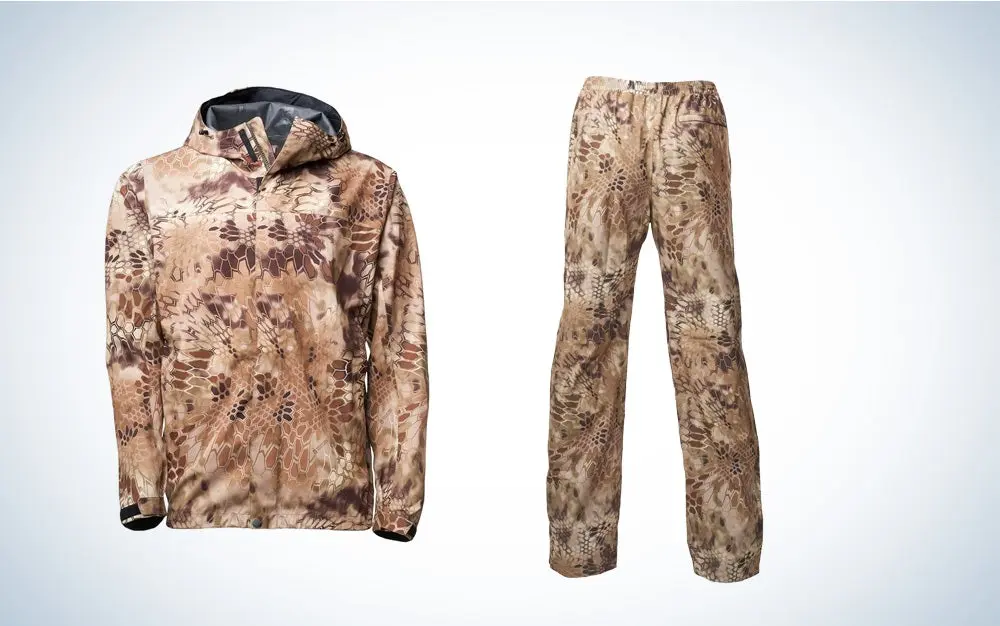
Specs
Weight: N/A
Waterproofing: Kryptek 10/10 waterproof fabric
Pros
More affordable
Extremely lightweight
Versatile
Cons
Noisy
Unfortunately, a quality piece of rain gear isn’t cheap. I know plenty of people who later regretted trying to cheap out on hunting rain gear. Kryptek offers some solid lightweight options with their Jupiter line. Both the jacket and pants are light enough for early season hunts before temperatures start dipping. They’re also ideal for turkey hunting. The breathable rain jacket packs entirely into the left pocket, making it easy to stow into a hunting pack
as backup for a backcountry adventure. The pants pack up nicely in a similar fashion.
This rain gear is a little nosier than we’d like, but in heavier downpours, that shouldn’t matter too much. It’s easy to layer, too. And given that it’s our best budget pick, the price point is great for both, especially since both pieces are frequently on sale. You can easily pick up both for under $200 if you can catch one at the right time.
What to Consider When Choosing Hunting Rain Gear
When it comes to rain gear for hunting, it helps to think situational while choosing. If you’re deer hunting
in the coastal regions of the Pacific Northwest or Alaska, you’ll need more of a midweight or heavy rain gear design than someone turkey hunting
in the south. While having a jacket that can withstand the worst of adverse conditions in handy, it can also become a detriment in warmer climates if it doesn’t breathe properly. Check out the waterproof ratings on garments before you buy. The higher the number in milimeters, the more abuse it can usually take.
I’m personally a stickler for zippers, especially with any garment designed for wet or cold conditions. The larger YKK-style zippers with a big pull are best for rain jackets
because they’re easy to grip, even when fingers are wet and cold. Carefully inspect the seams around the zippers and how well the pockets seal. Waterproof pockets are the ideal place to protect valuables like a cell phone. But only if they seal out the water like the rest of the garment.
Waterproof Coatings
All rain gear has some type of protective finish applied to the surface. It’s what helps rain bead up and slide off the surface, keeping you dry. Durable water repellent (DWR) is the most common. While these treatments are extremely effective straight from the factory, they lose said effectiveness over time. Eventually, you’ll notice the garment starts getting heavier because it’s now absorbing water that it previously shed.
The good news is that you can simply refresh the material instead of dropping a bunch of money on replacing your gear. In most cases, this means re-spraying the garment with a DWR replacement coating or a product like Nikwax
. Unless the garment got little use the previous season, it’s usually best to retreat the garments before every season. Follow the manufacturer recommendations for the best results.
FAQs
Q: Do you need rain gear for hunting?
If you are planning to hunt in rain or sleet, quality rain gear is a great investment. It doesn’t take long to get cold and miserable during a downpour in the treestand. But a good jacket and pants can make things a lot more tolerable. For some states that experience frequent rainfall during the hunting season, this type of gear becomes more necessary.
Q: Which type of raincoat is best for heavy rain?
Anything with a DWR (durable water repellent) finish is going to handle rain well. This type of water-resistant finish helps clothing shed away water. It helps significantly if the garment is also made of a waterproof material such as Gore-Tex. When the right clothing material is combined with the right coating, the results is seriously tough raingear built for the elements.
Q: What is the highest level of waterproof jacket?
Depending on the manufacturer, some rain jackets and pants will have water ratings in millimeters to convey how much saturation the garment can take. Generally, clothing that has a rating of 20,000 to 25,000mm is considered a heavy rain jacket.
Best Hunting Rain Gear: Final Thoughts
Best Overall: Forloh AllClima
Best for Spot and Stalk: Sitka Dew Point
Best for Extreme Conditions: Kuiu Yukon TR
Best For Waterfowl: First Lite Landing Zone
Best Budget: Kryptek Jupiter
Every hunter should have at least one rain outfit in their arsenal of hunting clothing. After all, you can’t harvest your target animal while hiding inside on the couch. While I feel like all the gear highlighted here today is a solid choice, I keep coming back to the Forloh AllClima
. It’s easily the best hunting rain gear I’ve ever worn—and arguably the best rain gear I’ve ever worn even outside of just hunting.
Why Trust Us
For more than 125 years, Field & Stream has been providing readers with honest and authentic coverage of outdoor gear. Our writers and editors eat, sleep, and breathe the outdoors, and that passion comes through in our product reviews. You can count on F&S to keep you up to date on the best new gear. And when we write about a product—whether it’s a bass lure or a backpack—we cover the good and the bad, so you know exactly what to expect before you decide to make a purchase.





